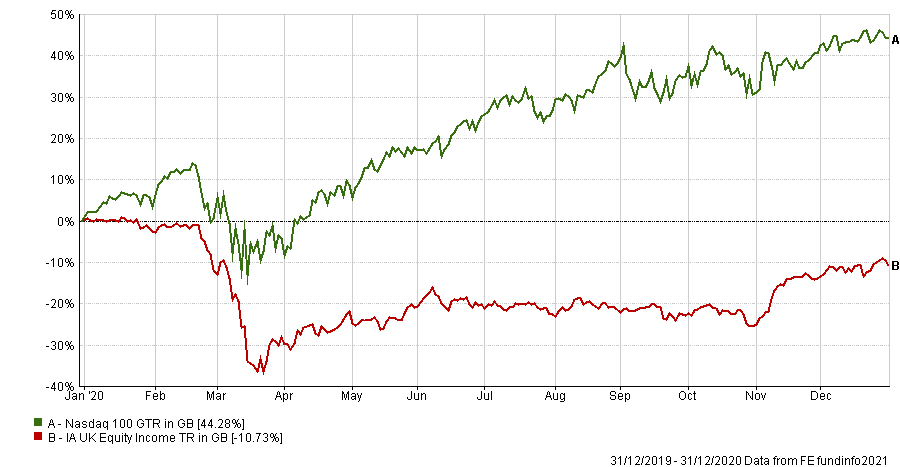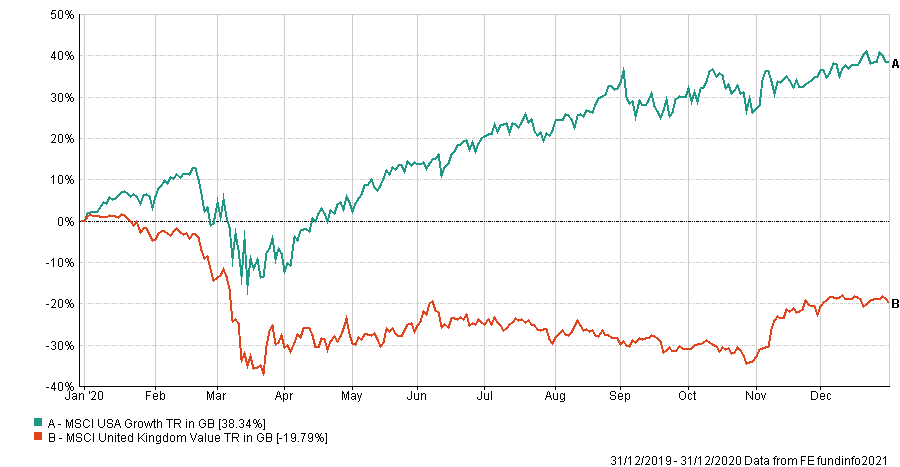The ‘starting pistol’ in the rally for value stocks may have been fired already, according to BMO Global Asset Management’s Gary Potter and Anthony Willis, who say that the roll-out of viable Covid-19 vaccines has changed the outlook for equity markets.
In their outlook for the year ahead, the managers were resolute on the importance of the vaccines, especially in fostering the kind of rally in value strategies that has been building for some time.
Willis, investment manager in BMO’s Multi-Manager People team, said: “2020 served as a reminder that ‘outlook’ commentaries tend to have a very short shelf life.
“As we assess the prospects for 2021, we recognise the futility of making predictions with a huge degree of conviction.
He continued: “The big question for financial markets is whether they can continue look through what is likely to be a pretty tough quarter from a socio-economic point of view and possibly even the first half of the year.”
The BMO manager said pent-up consumer demand combined with low interest rates and stimulus packages represent some clear tailwinds for financial markets in 2021.
“The combination of fiscal stimulus and loose monetary policy is a very potent mix,” Willis added.
Of course, while the situation is especially pertinent in the UK, the world awaits the moment when the vaccines for Covid-19 can catch up with the rate of transmission and cases.
“There is one word which will shape what happens in 2021 – and that word is vaccine,” said Potter, co-head of the Multi-Manager People team.
“We are really optimistic about the potential for our relative performance in 2021 and there is strong evidence for us bouncing back. The performance from 9 November, is an indication of the latent potential in our portfolios.”
Potter referred to that date in November as the ‘starting pistol’ for value strategies to start outpacing growth names, using the market in 2018 as a comparison for this year.
“Simply put, the more the real economy grows, the more liquidity gets syphoned away from financial assets and vice versa,” he said. “The last few years and 2020 were almost textbook examples of this phenomena.
“Spurred by supply-side tax cuts at the end of 2017, the economy strengthened meaningfully in 2018 especially in the form of capital spending and the Fed tightened monetary policy.”
He said markets fell in 2018 but then the whole process was reversed in 2019 as concerns about a trade war slowed, long-term interest rates fell, and liquidity came back to financial assets.
“This is why we’re optimistic about the second half of the year,” added Potter. “It could be a mirror of 2018. If the vaccine works and the global economy gets back to some sense of normality, then you can be sure that the money that’s gone into financial assets could be channelled away into the real economy and financial assets might not do as well.”
This is where he believes, the mean reversion will occur.
“I look at the gap between the UK equity income sector and the Nasdaq,” said Potter. “UK equity income is a bell weather for large, blue-chip UK stocks, and it didn’t do very well last year.”
Performance of UK Equity Income sector vs Nasdaq 100 in 2020

Source: FE Analytics
Indeed, for 2020 as a whole, the Nasdaq 100 was up 44.28 per cent, while the average peer in the IA UK Equity Income sector was down 10.73 per cent.
“I have never seen those two indices be so far apart,” he said. “I firmly believe that 9 November 2020 is the start of value reversing its underperformance.”
BMO’s Potter said that when the performance of big tech firms starts to falter, the valuations will look increasingly unrealistic.
“I’ve been around for 40 years in markets and I’ve seen it time and time again,” added Potter. “Trees don’t grow out the sky forever and reality kicks in – if this vaccine works then this will fall.”
Performance of MSCI UK Value vs MSCI USA Growth over 2020

Source: FE Analytics
In a similar vein, he highlighted the stark difference between US growth and UK value.
The MSCI USA Growth index was up 38.34 per cent for 2020 as a whole, while the MSCI UK Value index posted a loss of 19.79 per cent.
The managers said that if the economy recovers as they anticipate in 2021, then value names will rally strongly amidst the more expensive growth stocks.
“This should be particularly beneficial to stock markets such as Europe and the UK where cyclical and value names have held markets back, most notably in comparison with the more growth dominated US,” said Willis.
“I have never seen that extent of underperformance in the US growth and UK value indices before,” added Potter. “Common sense investing, and decent, sensible valuations will start working again – especially if there is that economic confidence.”
Potter said ultimately he expected a stronger economy which is second half loaded, “uninspiring” index returns, and value, international and small-cap to outperform US growth and large-cap.
“I cannot emphasise how clear we are on the way markets could be,” he finished. “The trends of the last two years are going to reverse.”






